Where people have an appetite for agility
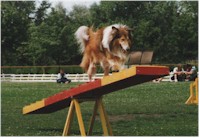 In
Hungary, agility began in the early 1990s. At first, only former obedience and guarding dogs
were doing it. After a while, it became the most popular dog sport in the country, and that's
when a lot of today's handlers bought their future agility puppies. Agility handler Bernadett
Felleg explains... In
Hungary, agility began in the early 1990s. At first, only former obedience and guarding dogs
were doing it. After a while, it became the most popular dog sport in the country, and that's
when a lot of today's handlers bought their future agility puppies. Agility handler Bernadett
Felleg explains...
Most agility dogs are Belgian Shepherds, but there are
many other breeds doing agility as well. For example, there are some pretty good Hungarian
breeds such as Pumi, Mudi and Vizsla. There are some Border Collies, but their handlers are not
good enough yet to be on the top.
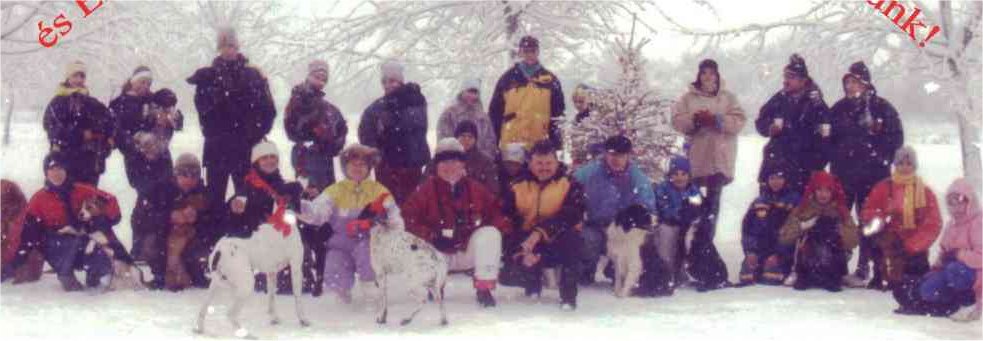 Training
outside Training
outside
In Hungary, we 'dream' of being able to train inside. We try to practice two times a week, or
if there is a trial at the weekend, at least once. As we don't have our own equipment,
we go to our club where we run sequences and courses, too.
At this time there are about 20 agility clubs and 200-250
competitors in the country. Sorry to say, but agility is not a well known and accepted sport
here. Those people who do it are fanatics and they do agility with at least two
dogs.
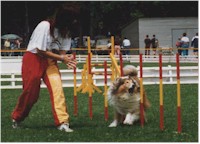 Competitors
welcome Competitors
welcome
We have a lot of trials where almost everybody takes part. Because it is a small
country, we don't have to travel far. Every place can be reached in a few hours so we compete
on every second weekend.
Competitors from any country are welcome. We used
to have trials where competitors take part from four or five states! I haven't heard of any
European country which is barred. It will be nice to have the English competing too. Nor are
there any problems in Austria, The Czech Republic, Slovakia or Slovenia, etc. The only thing
you need is an agility workbook.
 There
are three levels of classes (A1, A2, A3 - FCI rules) for Standards and Minis. To enter in A2,
you have to run 'Excellent' (no more than 5.99 faults) agility course three times. To be an A3
team, you need three agility course with no faults and you must be in the top three places on
an A2 course. We also have jumping runs and courses for Teams (clubs). There
are three levels of classes (A1, A2, A3 - FCI rules) for Standards and Minis. To enter in A2,
you have to run 'Excellent' (no more than 5.99 faults) agility course three times. To be an A3
team, you need three agility course with no faults and you must be in the top three places on
an A2 course. We also have jumping runs and courses for Teams (clubs).
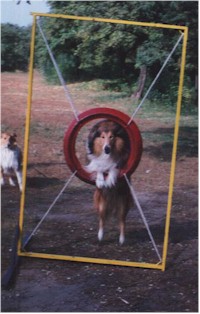 The
World Championships The
World Championships
The National Championships are held at the end of the year in a sports hall, but it
is only a one day competition. The greatest event in our lives in the FCI World Championships
where four Minis and four Standards dogs are selected to represent the country.
Hungary first participated in the FCI World Championships
as a national team in 1993. From that year onwards, we have taken part on the championships
every year. The best place was Fifth of our Standard team and Sixth of the Mini team (1998).
Unfortunately, we still haven't had any individual competitors in the top ten.
Guest trainers wanted
In the summer, we have an about ten day long agility camp, with a course where the
best Hungarian agility specialists give lectures. In 1997 and 1999 Mr. John Gilbert was also
invited for a seminar, and he was a great success. If we had the money, we would like to invite
a French trainer next.
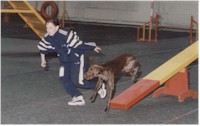 About
the author... About
the author...
Bernadett Felleg started doing agility since 1993, first with a Vizsla (Hungarian Pointer).
After he died she bought her German Pointer, Döme.
Six year old Döme is one of the fastest dogs in Hungary.
He became an A3 very early. They were members of the National Team at the World Championships
in Copenhagen (1997) and were substitutes in Dortmund (1999). Her other dog, Döme's two year
old son Spuri is also a fanatic agility dog, but is still inexperienced.
Bernadett lives in Budapest and trains with the Dogfit
Club in Dunakeszi, near Budapest.
Just an aside
from Pat Knepley
Re: In our country (Hungary) everybody is allowed to compete...
Don't know if things have changed, but the entries are
done very differently there. You pay at the post office. Interesting, eh?
Thanks to agility handler and referee Melinda Csecserits of Meda-garden Collie Kennel for
sending photos. You can visit her site at
http://w3.swi.hu/~medalind.
Other pictures of Hungarian breeds can be seen on http://www.tar.hu/hubreeds.
Photo of Pumi jumping: Andrea Olajos.
|